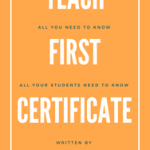by Nicola Prentis
 Book Review by Pietro Pacini
Book Review by Pietro Pacini
This is a highly practical book, which I now use regularly with my students. It is addressed to those who are preparing students – already at B2 level (Upper Intermediate) for the First Certificate exam.
Prentis’ approach is strikingly innovative because it lets candidates take responsibility for passing the exam. As the writer underlines, “the person that’s going to pass (or fail) this exam is THEM. So this book is going to prepare you to teach them by instilling that into them every step of the way”.
You will find the book, in 69 pages, a precious mine of ideas if:
- you’ve never taught First Certificate before;
- you want to know the most efficient techniques for getting your students through the exam, even if you’ve taught it for years;
- you want to be able to advertise your services as an expert in First Certificate.
I particularly enjoyed the chapter “The paper they’re most afraid of”.
After giving a definition of a TLS (Typical Language Student) contrasted to a SLL (Successful Language Learner) in the introduction, Nicola also provides useful online references to level tests, past papers and free resources. I totally agree with the following ranking of the papers which earners are most afraid of, from the one they rate“the most difficult” to what they consider “the easiest”:
- Listening
- Use of English
- Speaking
- Writing
- Reading
I wish to draw your attention to how Nicole rates listening: “The Listening paper is hard”, candidates are required to listen and to read at the same time which implies a considerable “cognitive load”, which means “the amount of work their brain is doing” and it is very high when doing two different things at the same time. However, Nicole suggests very useful strategies: learners should be watching TV and films in English to improve their listening, they have to be used to listening without worrying that they don’t understand every word. A detailed description of possible ways to make students aware of the various techniques to cope with the whole paper is introduced.
Overall, there is so much that is useful: techniques to pass FCE Use of English, Speaking, Writing and Reading are thoroughly analysed.
I enjoyed the book: it has convinced me of the value of Nicola’s approach. I feel I must also stress that this book is not only for teachers; a few students of mine read the e-book and found it stimulating and very useful. They took on board the fact that ultimately they are responsible for passing or failing the exam. I would strongly recommend this book.




